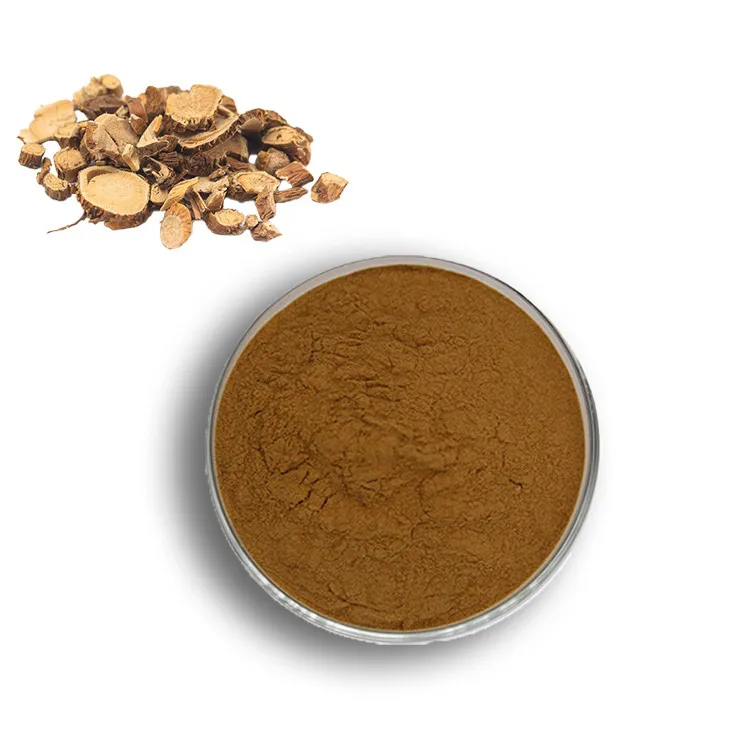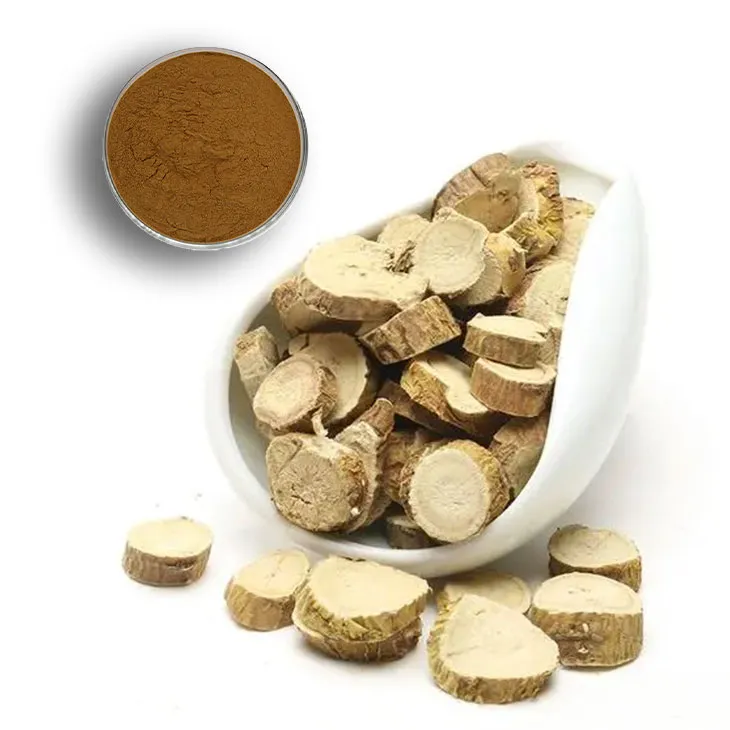- 0086-571-85302990
- sales@greenskybio.com
Does sophora flavescens root extract have benefits for diabetes? Are these all safe and applicable for diabetic patients?
2024-11-12

1. Introduction
Diabetes mellitus is a chronic metabolic disorder that has reached epidemic proportions globally. The search for effective and safe treatments, including complementary and alternative therapies, has been on the rise. Sophora Flavescens Root Extract, a traditional herbal remedy in some cultures, has been proposed as a potential treatment for diabetes. However, its true benefits and safety for diabetic patients need to be thoroughly investigated.

2. Pharmacological Properties of Sophora Flavescens Root Extract
2.1. Active Compounds
The root of Sophora flavescens contains several bioactive compounds. Matrine and oxymatrine are two of the most important alkaloids present in it. These alkaloids have been shown to possess a wide range of pharmacological activities.
Matrine has been reported to have anti - inflammatory properties. Inflammation is often associated with diabetes, especially in the context of insulin resistance and diabetic complications. By reducing inflammation, matrine may potentially improve insulin sensitivity. Oxymatrine, on the other hand, has been shown to have antioxidant effects. Oxidative stress is another major factor contributing to the development and progression of diabetes. Antioxidants can scavenge free radicals and protect cells from oxidative damage, which may be beneficial for diabetic patients.
2.2. Mechanisms of Action Relevant to Diabetes
One of the proposed mechanisms by which Sophora Flavescens Root Extract may affect diabetes is through the regulation of glucose metabolism. Some studies suggest that it may influence key enzymes involved in glucose uptake and utilization. For example, it may enhance the activity of glucose transporter 4 (GLUT - 4), which is responsible for transporting glucose into cells. This can lead to a reduction in blood glucose levels.
Another possible mechanism is related to its effect on the liver. The liver plays a crucial role in glucose homeostasis. Sophora flavescens root extract may modulate hepatic glucose production. It could inhibit enzymes involved in gluconeogenesis, such as phosphoenolpyruvate carboxykinase (PEPCK) and glucose - 6 - phosphatase (G - 6 - Pase). By reducing hepatic glucose output, it can contribute to better blood glucose control.

3. Clinical Research Findings
3.1. Animal Studies
Several animal studies have been conducted to evaluate the effect of Sophora flavescens root extract on diabetes. In diabetic mouse models, treatment with the extract has shown promising results.
- One study found that diabetic mice treated with Sophora flavescens root extract had significantly lower blood glucose levels compared to the untreated control group. The extract also improved insulin sensitivity in these animals.
- Another animal study demonstrated that the extract could reduce the incidence of diabetic complications. For example, it was shown to protect against diabetic nephropathy by reducing albuminuria and improving renal function markers.
3.2. Human Studies
However, human studies on the effect of Sophora flavescens root extract on diabetes are relatively limited.
A small - scale clinical trial was carried out in a group of type 2 diabetic patients. The results showed that the extract, when used as an adjunct to standard diabetes medications, might have a mild hypoglycemic effect. However, the sample size was small, and more comprehensive and large - scale studies are needed to confirm these findings.
There are also some case reports suggesting that some diabetic patients who self - administered Sophora flavescens root extract reported improvements in their blood glucose control. But these case reports lack proper control groups and standardized evaluation methods, so their scientific validity is limited.

4. Suitability for Different Types of Diabetes
4.1. Type 1 Diabetes
Type 1 diabetes is an autoimmune disease where the body's immune system destroys the insulin - producing beta cells in the pancreas. Currently, the main treatment for type 1 diabetes is insulin replacement therapy.
The potential role of Sophora flavescens root extract in type 1 diabetes is less clear. Since the root cause of type 1 diabetes is the lack of insulin production, any treatment aiming to improve diabetes in this case would need to work in conjunction with insulin therapy. Some theoretical mechanisms suggest that the anti - inflammatory properties of the extract might be beneficial in reducing the autoimmune response in type 1 diabetes, but this has not been proven in clinical trials.
4.2. Type 2 Diabetes
Type 2 diabetes is characterized by insulin resistance and relative insulin deficiency. Given the potential mechanisms of Sophora flavescens root extract in improving insulin sensitivity and regulating glucose metabolism, it may have more potential in the treatment of type 2 diabetes.
As mentioned earlier, some small - scale human studies and more extensive animal studies have shown positive effects of the extract on blood glucose control in type 2 diabetes. However, it is important to note that lifestyle modifications and standard pharmacological treatments remain the cornerstone of type 2 diabetes management, and the use of Sophora flavescens root extract should be considered as an adjunct therapy at best for now.
5. Safety Considerations
5.1. General Toxicity
While Sophora flavescens root extract has shown potential benefits, its safety also needs to be carefully evaluated. In general, some studies have reported that high - dose or long - term use of Sophora flavescens root extract may cause certain toxic effects.
For example, in some animal studies, high - dose administration of the extract led to liver and kidney toxicity. These findings raise concerns about its safety in diabetic patients, especially those with pre - existing liver or kidney problems.
5.2. Drug Interactions
Diabetic patients are often on multiple medications. Sophora flavescens root extract may interact with some of these drugs. For instance, it may interact with hypoglycemic medications, potentially leading to an increased risk of hypoglycemia. It could also interact with medications metabolized by the liver or kidneys, affecting their efficacy or increasing the risk of adverse effects.
It is crucial that diabetic patients consult their healthcare providers before using Sophora flavescens root extract, especially if they are taking other medications.
6. Conclusion
In conclusion, Sophora flavescens root extract shows some potential benefits for diabetes through its various pharmacological properties and mechanisms of action. Animal studies have provided some evidence of its positive effects on blood glucose control and prevention of diabetic complications, and small - scale human studies suggest a possible mild hypoglycemic effect in type 2 diabetes.
However, its safety is a major concern. High - dose or long - term use may cause toxicity, and there are potential drug interactions. More research, especially large - scale, well - designed human clinical trials, is needed to fully understand the benefits and risks of Sophora flavescens root extract for diabetic patients. Until then, diabetic patients should be cautious when considering using this extract and should always consult their healthcare providers.
FAQ:
1. What are the main pharmacological properties of Sophora flavescens root extract?
The Sophora flavescens root extract contains various bioactive components. For example, it has alkaloids which may possess antioxidant, anti - inflammatory, and antimicrobial properties. These properties might potentially play a role in diabetes management. Antioxidant effects can help reduce oxidative stress, which is often increased in diabetic patients. However, more research is needed to fully understand how these pharmacological properties specifically interact with the pathophysiology of diabetes.
2. Are there any clinical studies on the effect of Sophora flavescens root extract on diabetes?
There have been some clinical studies exploring the effect of Sophora flavescens root extract on diabetes. Some studies suggest that it may have a positive impact on blood glucose levels. However, the evidence is not yet conclusive. The sample sizes in some of these studies may be relatively small, and the study designs may vary. More large - scale, well - designed clinical trials are required to firmly establish its effectiveness in treating diabetes.
3. How might Sophora flavescens root extract affect different types of diabetes?
Type 1 diabetes is an autoimmune disease where the body's immune system attacks the insulin - producing cells in the pancreas. Sophora flavescens root extract may potentially help manage associated inflammation, but its impact on insulin production in this context is still unclear. For type 2 diabetes, which is often related to insulin resistance and lifestyle factors, the extract's antioxidant and anti - inflammatory properties might improve insulin sensitivity. However, it's important to note that these are just theoretical possibilities and more research is needed for a definite understanding.
4. What are the potential risks of using Sophora flavescens root extract for diabetic patients?
Although Sophora flavescens root extract may show some potential benefits, there are also potential risks. Some components in the extract may cause adverse reactions such as allergic reactions in certain individuals. Also, if not properly processed or used in excessive amounts, it may have toxic effects on the liver or kidneys. Moreover, it may interact with other medications that diabetic patients are taking, potentially altering the effectiveness or safety of those medications.
5. Can Sophora flavescens root extract be used as a substitute for conventional diabetes medications?
No, at present, Sophora flavescens root extract cannot be used as a substitute for conventional diabetes medications. While it may show some beneficial effects in research, it has not been proven to be as effective and reliable as the existing medications. Diabetic patients should always follow their doctor's advice and continue with their prescribed medications. The extract may only be considered as a complementary approach under strict medical supervision.
Related literature
- The Pharmacological Effects of Sophora flavescens Root Extract in Metabolic Disorders"
- "Clinical Trials on Sophora flavescens Root Extract for Diabetes Management"
- "Sophora flavescens Root Extract: Potential Benefits and Risks in Diabetic Patients"
- ▶ Hesperidin
- ▶ Citrus Bioflavonoids
- ▶ Plant Extract
- ▶ lycopene
- ▶ Diosmin
- ▶ Grape seed extract
- ▶ Sea buckthorn Juice Powder
- ▶ Fruit Juice Powder
- ▶ Hops Extract
- ▶ Artichoke Extract
- ▶ Mushroom extract
- ▶ Astaxanthin
- ▶ Green Tea Extract
- ▶ Curcumin
- ▶ Horse Chestnut Extract
- ▶ Other Product
- ▶ Boswellia Serrata Extract
- ▶ Resveratrol
- ▶ Marigold Extract
- ▶ Grape Leaf Extract
- ▶ New Product
- ▶ Aminolevulinic acid
- ▶ Cranberry Extract
- ▶ Red Yeast Rice
- ▶ Red Wine Extract
-
Almond Extract Powder
2024-11-12
-
Thunder God Vine Extract
2024-11-12
-
Dan Shen Root Extract/Salvia Root Extract
2024-11-12
-
Genistein
2024-11-12
-
Citrus Aurantium Extract
2024-11-12
-
Centella Asiatica Extract
2024-11-12
-
Hesperidin
2024-11-12
-
Acai Berry Extract
2024-11-12
-
Mango flavored powder
2024-11-12
-
Licorice Root Extract Powder
2024-11-12





















